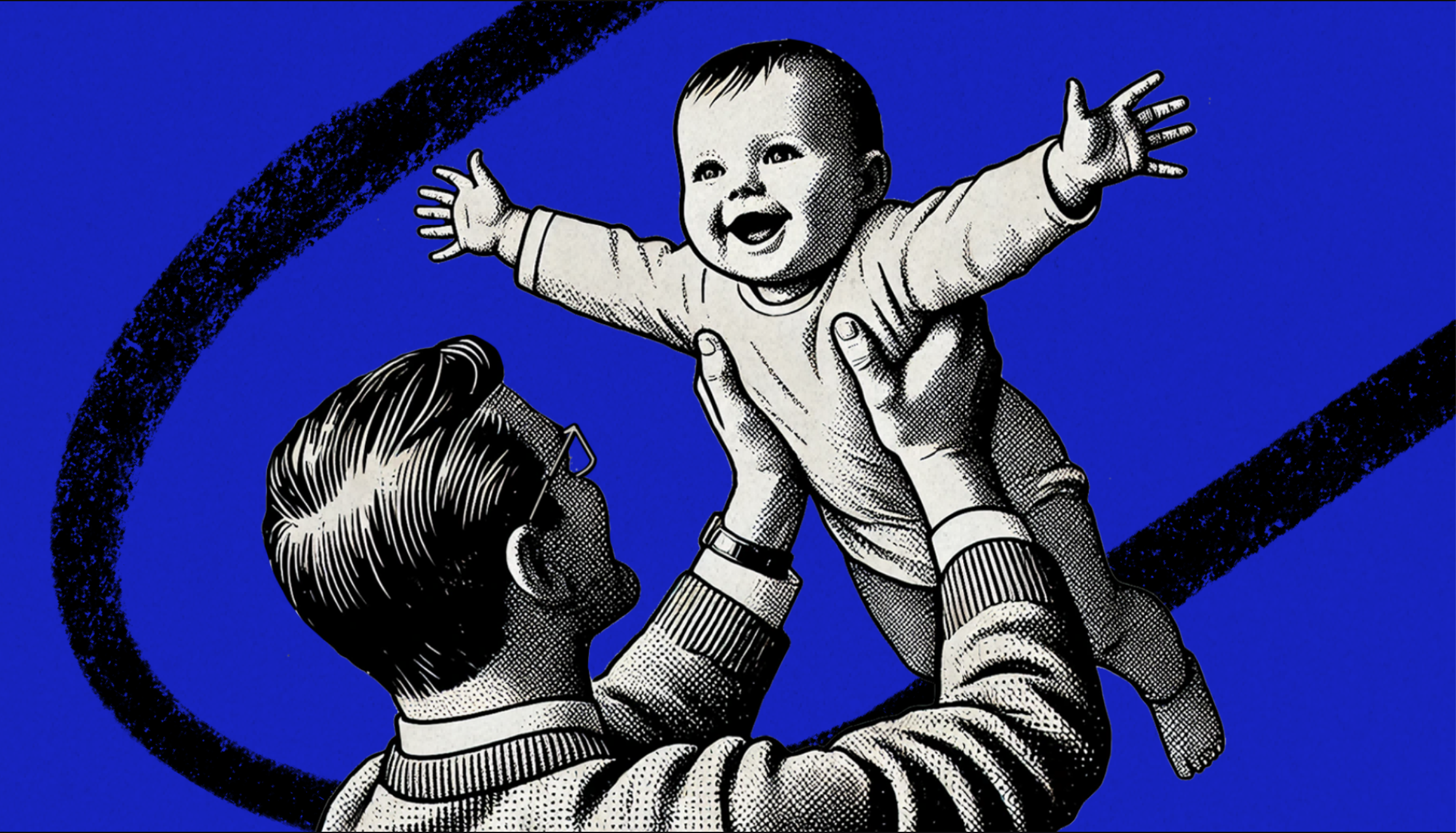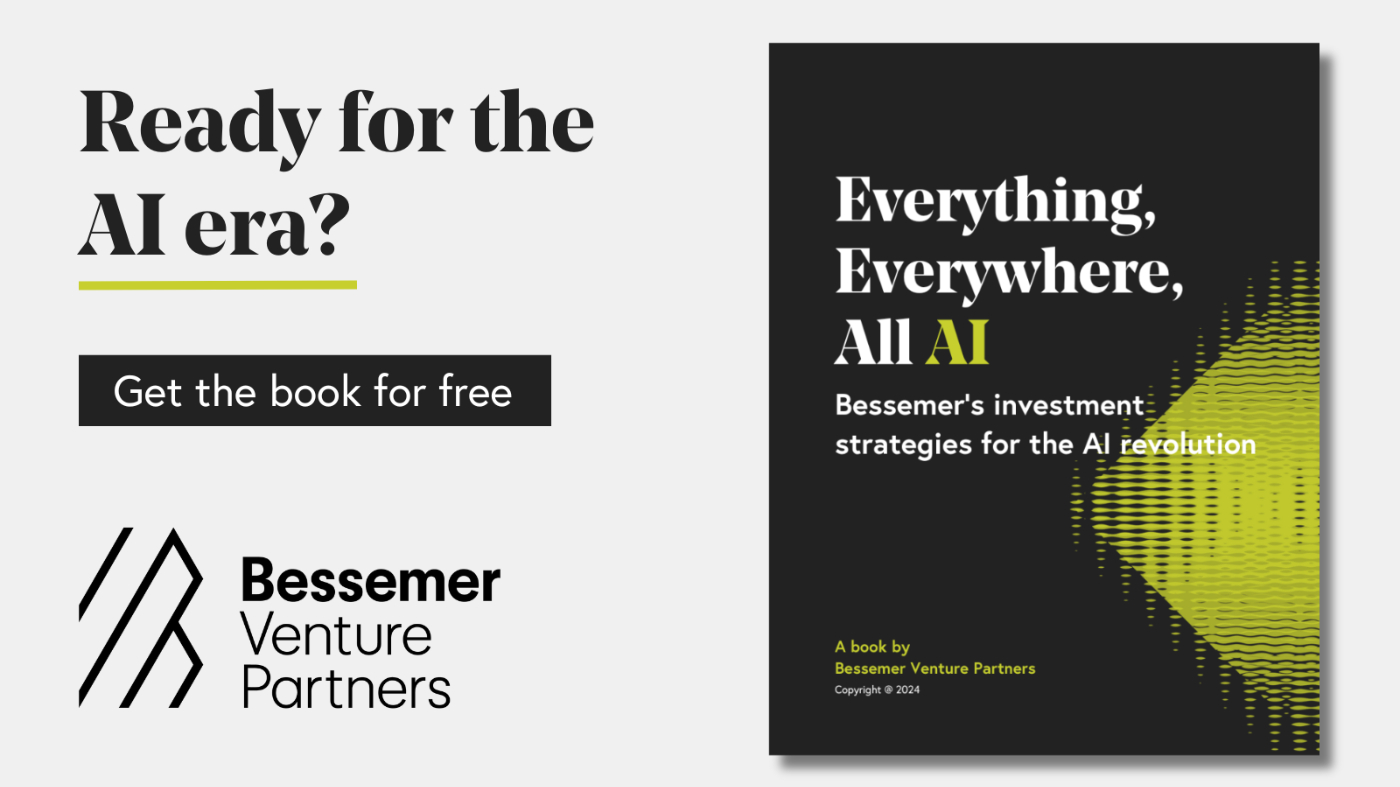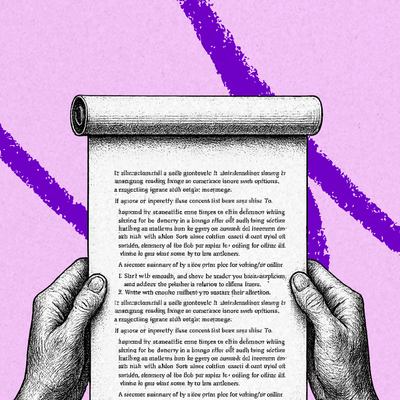
Sponsored By: Bessemer Venture Partners
This essay is brought to you by Bessemer Venture Partners, a leading venture capital firm investing in artificial intelligence. Discover how AI is transforming industries and creating new entrepreneurial opportunities with their latest free ebook, Everything, Everywhere, All AI. Dive into strategies and real-world case studies that will help you stay ahead of the AI revolution. Ready for the AI era?
Was this newsletter forwarded to you? Sign up to get it in your inbox.
When my wife handed me a pregnancy test, a faintly pink cross indicating a positive result, I mostly felt one thing: fear. The kid was planned for, and our marriage was the best it had ever been. By every metric, this was an ideal time for us to grow our family. Still, holding that test, I felt more terrified than elated.
To me, that little plastic stick—on sale with a BOGO—wasn’t just a pregnancy test. It was shining a bright, searing light into my interior self, forcing me to confront the problem that was, well, me. At that moment, I realized that the issues I used to kick to tomorrow needed to be addressed today.
Mainly, I realized that it was all on my wife and me. The only future opportunities the child would have would be the ones that we could provide. Did I want my kid’s daycare to be a windowless basement with no real education program? That would be $2,800 a month. Did I want my baby to have organic snacks, teachers with master’s degrees, and a window? Be prepared to shell out $52,000 annually. That money wasn’t just going to appear—it was on us, and no one else, to make it happen. (These are all real prices for daycare in Boston, by the way.)
Being forced to confront the cold reality of “If you suck, your child’s life will suck” isn’t exactly motivating. Over the past eight months, however, I have found that pending parenthood is a forcing function of positive improvement. It sounds a bit crazy, but if you want to be better at life, a kid is a surefire way to make you improve fast.
Realizing how much was on me suddenly and totally shifted my brain. There was an audible revving sound that sounded through my skull as my mind kicked into a new gear I did not know existed. My wife lovingly calls it “dad mode.” It has been a revolution in how I approach my career, my priorities, and my approach to health and partnership.
Dad mode has changed my life for the better in ways that I believe are valuable for people who are ambitious and care a lot about their careers—even if they aren’t parents-to-be. To put it bluntly, it is unfair to expect a child to put up with your shit. The only moral choice an expectant parent can make is to get your shit together.
AI is here and reshaping every market. Everything, Everywhere, All AI from Bessemer Venture Partners offers deep dives into market analysis and actionable insights for leaders as they navigate the quickly evolving AI economy. Explore how top companies are harnessing AI to drive growth and innovation. This free book also reveals Bessemer's unique operating model, designed to support and back today's top AI-first founders. Ready to craft your winning AI strategy?
Dad careers
Here's the thing about impending fatherhood: It's like someone cranked up the contrast on a photo of your life. Suddenly, everything that was a bit fuzzy or gray comes into sharp focus. And let me tell you, some of that clarity isn't pretty.
In college, there was always some career counselor trumpeting the importance of “pursuing your passion” or “following your bliss.” Perhaps you were told something similar. And honestly, for most of my career, I believed this. It seemed logical to me: Your time is limited, so you might as well work on something that you find meaningful.
The flaw in this logic lies in the verb: to “work on.” Dad mode jolted me awake to the possibility that it is more meaningful to work for something, not on. I realized that the point of work is what it enables you to do, not what you actually do on a day-to-day basis. I get meaning from my career not by working on something I care about, but by working for people I love.
Companies are profit-seeking, amoral blobs of activity—not moral arbiters. Their legal structure is designed to make money for shareholders. A company that invokes “making a difference” or “doing what you love” as a benefit for its employees is doing so because these things are non-cash benefits. It is far cheaper to make employees feel good than to pay them enough to motivate them.
While building products that make the world better is great, it is a mistake to rely on companies for meaning. That isn’t why they exist, and trying to smush our life’s mission into an environment dedicated to maximizing capital returns is a recipe for disappointment. It is unfair to expect our jobs to simultaneously be our social clubs, our religion, and the way our bills are paid.
Dad mode meant realizing that I ascribed far too much meaning to what I did. For years, I had made career decisions that prioritized my passions over financial gain. While I’m happy with where my life is, I do regret not trying to maximize my earnings so that I could easily afford the lifestyle I want to provide for my family.
Within a few weeks of the pregnancy, I realized how short I would be on upcoming baby bills and started scrambling. I created a new cohort-based course called "How to Write With AI" that has over 90 students. (Three weeks in, our customer surveys show that they are very satisfied.) For most of my writing career, I had avoided doing this sort of add-on product because I wanted to focus on honing my craft. Once that test came back positive, I realized that this was a passion-based mental block—one that was stripped away the instant I realized what would be required of me.
Dad mode meant realizing that what drove meaning for me was my home life, not my work. I love writing at Every, but what really matters is that working here enables me to serve what my real passion is: my family.
Dad minutes
In dad mode, a minute becomes far more expensive than it was before. When you have a kid, you could theoretically be spending every moment on something more important than yourself. That doesn’t mean that you shouldn’t have any “me time.” I’m just saying that dad mode forces you to consider how you are using each minute and what the benefits of that minute are. The first time I realized this was with my PlayStation 5.
Every Friday, my wife and I have a date night where we go out to dinner and the movies. The week after my wife told me we were expecting, I made a pit stop at GameStop before dinner, carrying a Trader Joe’s bag overflowing with disks, HDMI cables, and controllers. I bumped the door open with my hip and plopped my PS5 on my counter. “I’d like to sell this, please,” I said.
I have loved video games for my entire life. Middle school was all about Halo 2. College was Call of Duty. At one point, I was a top 1 percent OverWatch player in the world (embarrassing). But earlier that week, as we forecasted our bills and realized how tight things were about to be, my wife said that she’d been hoping to purchase something to wear that would make her feel beautiful while pregnant. It wasn’t clear if we would have money for little things like that.
Over the next few days, I kept thinking about her worry. Pregnancy is so incredibly challenging, and here was this small burden that surely I could remove. That Friday, as I continued to think about it, dad mode snapped into place. I packed up my PS5 with no hesitation.
At dinner that evening, I presented my wife with an envelope full of cash. The hours and hours of video games I used to play had dramatically increased in price. There was a far better way to spend that time and money.
Some variation of this dad mode has happened in nearly every aspect of my life. As I go about my day, I am forced to re-evaluate every habit, possession, and choice from the perspective of being a father.
Another silly example: Every Monday, my lifting coach programs a brutal combination of isometric bicep holds and farmer’s carries. For both exercises, I hold weights in painful positions for 45-90 seconds, my muscles burning and throbbing. At first, I would rarely be able to finish the sets. But then my coach started calling them “toddler carrys” and explained how these exercises had been useful for hauling his own kids around. Suddenly, I had no issue completing the exercises, and started piling on heavier and heavier weights.
Here was a new reason for me to be fit and strong, beyond mere vanity or personal health. I needed to be fit and strong because my wife and kid would rely on me to help out around the house.
Since entering dad mode, I’ve lost weight; hit new personal bests on my back squat, deadlift, and benchpress; and become much more disciplined with my diet. This wasn’t hard to do. I just needed a reason why this stuff mattered, beyond looking good.
We all need a dad mode
Perhaps the real lesson is that we all need a "dad mode" moment—a wake-up call that forces us to confront our shortcomings and motivates us to improve. I'm skeptical of the notion that everyone needs to have children to mature, but there's something uniquely motivating about realizing that you're responsible for a tiny human's existence.
We shouldn't need to go through an enormous life change to get our act together. But let's be honest: Most of us are behaving like overgrown adolescents, chasing "passion" and "purpose" while our bank account dwindles and our future self shakes their head in disappointment.
We're so preoccupied with finding meaning in our job that we forget that the most meaningful thing we can do is be a decent, responsible human being. Dad mode takes all that existential fluff and boils it down to one simple question: Am I doing right by the people who depend on me?
So here's my challenge for you, dear reader: Find your own "dad mode" trigger. Maybe it's not a child. Perhaps it's a pet, a partner, a community project, or even just your future self. Find something that motivates you to be better, something that makes you realize that your actions have real consequences outside of your own, self-centered existence. Because ultimately, whether you're changing diapers or changing the world, the most important thing is that you're doing right by the people who depend on you.
Dad mode isn’t about self-improvement for its own sake. It’s about stepping up and meeting the responsibilities you've taken on. My wife just finished her maternity photo shoot wearing the dress and jewelry that my PS5 had paid for. Seeing how happy those photos made her felt far better than any video game ever has.
Evan Armstrong is the lead writer for Every, where he writes the Napkin Math column. You can follow him on X at @itsurboyevan and on LinkedIn, and Every on X at @every and on LinkedIn.
The Only Subscription
You Need to
Stay at the
Edge of AI
The essential toolkit for those shaping the future
"This might be the best value you
can get from an AI subscription."
- Jay S.
Join 100,000+ leaders, builders, and innovators

Email address
Already have an account? Sign in
What is included in a subscription?
Daily insights from AI pioneers + early access to powerful AI tools










Comments
Don't have an account? Sign up!
I never had kids, but found "dad" mode early in life due to chronic illness and an expectation I might have to retire early. I reached the place where I had "enough" - and also made a turn around healthwise a few years ago. Dad mode was flipped off in more ways than one.
Would slightly caution against wholly subsuming yourself into providing for the little one. They will do just fine with warmth, love, food and water - especially in the early years. Much of the rest is just a kind of consumerism - and marketers and their enablers (other parents, wider society etc) are really good at guilting parents into thinking what they are doing is not enough. You will, however, do just fine.
@christian.graham well said.
@christian.graham Hi Christian, this is Kate Lee, the EIC of Every. We'd like to include your feedback in our Sunday newsletter. Would you either respond here or email me at [email protected] with your job function/industry? Thank you!
@kate_1767 No problem, Kate. I have emailed it to you.
This is exactly what I needed to hear right now. Thanks Evan.
I loved this post, and enthusiastically endorse it inasmuch as it's about making yourself and your relationship better. That said, I have three kids, and a thing I tell every expectant parent is that there is a whole ecosystem of sophisticated parties whose behavior toward expectant and new parents ranges from enthusiastic marketing to predation. You almost surely don't need a bottle warmer, a portable playpen, a robot cradle to rock the child, etc.. You don't need to read a ton of books on how to raise a baby the French or Chinese or Cherokee way. Humans have been having kids for a long time with incomparably less information and resources than we have. You got this!
@matthewknox Hi Matt, this is Kate Lee, Every's EIC. We'd like to include your comment in our Sunday newsletter. Would you please respond to this (or email me directly at [email protected]) with your job function? Thank you!
@kate_1767 please do! my LI is https://www.linkedin.com/in/knoxmatt/ - I'm a principal engineer at reddit.
This totally captures my life experience. When it was just me I was ambitious for my own sake and did work where I believed in the cause. Now I don’t care if I’m building better rubber bands or mouse traps, I have three girls and their future is everything to me. I’ve never worked harder in my life and both at my career and on improving myself. It’s my job to be the best parent I can be, so I need to fix my baggage for them.
Great article, really resonated :)
For me, dad mode kicked-in a bit differently. It had to do with efficiency and time management.
When I got that pregnancy test (from a local pharmacy in Abu Dhabi, a day after we got married there 😅), after the joy, my next thought was: “ok, I have so much I want to do when I still have tons of free time!”.
In our first date our told my wife I want to do a triathlon, but I never actually started training. Once we came back I immediately signed up, and 6 month later I finished an Olympic one, while she cheered me with a 8-month belly 😂
Then, in the year that passed, I became so much more efficient with my time. I managed to achieve much MORE then before the birth - writing 2 newsletters, a promotion, read tons of books. Crazy what constraints on our time can contribute to.
great piece, thanks Evan